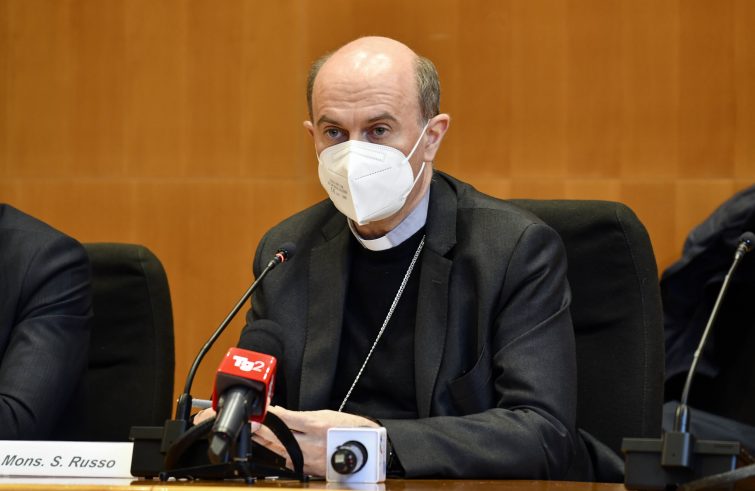
As regards the next President of the Republic “the statement by the Cardinal President was widely appreciated and applauded”, said Monsignor Stefano Russo, Secretary General of the Italian Bishops’ Conference, in response to questions from journalists during the presentation of the final declaration of the Permanent Episcopal Council, which ended yesterday in Rome. “Hopefully,” Msgr. Russo continued, outlining an ideal profile of the new head of state, while Parliament’s round of voting is under way, “he will be a guarantor, a person that is able to foster and work for the unity of the country – especially at a time like this.” “This is what we need most of all: to walk together,” he concluded.
Day of Remembrance. The Secretary General read out a statement marking Holocaust Remembrance Day on behalf of the Italian bishops. “The Church in Italy calls for the Day of Remembrance to serve as a beacon for a culture of peace, respect and brotherhood,” the statement reads: “Sadly, despite this tragic past, to this day we still face daily threats and manifestations of violence. Wars, genocides, persecutions, fanaticisms of various kinds continue to occur, although history has shown that violence never leads to peace. Today we repeat: Crimes of such magnitude against humanity must never happen again!”
Health emergency. “Anti-vax clergy are a cause for concern. We hereby reaffirm the moral importance of vaccination, which means wanting the good of oneself and of others, of the community,” Russo pointed out, explaining that the intention of the Italian Church “is to remain close to such situations, and should they continue to persist, to do everything possible to ensure the safety of persons participating in the life of the Church.”
Synod. “The Synodal journey of the Italian Church is a source of enthusiasm, in harmony with the Synod of the Universal Church called by the Pope.” The Secretary General of the Italian Bishops’ Conference assured that “even in these difficult times, our communities are embracing the Synodal process, with the involvement of the young. The period of listening that characterises this first year and also the next, is a propitious time to collect suggestions on our journey from the local communities.” The upcoming Assembly of Italian Bishops, to be held in May, will be an “important stage” in the synodal process.
Mediterranean. “A beautiful opportunity, which highlights the need to come together to build bridges between us.” With these words, Msgr. Russo hailed the event on “The Mediterranean, Frontier of Peace”, scheduled to take place in Florence on 23-27 November. For the first time, bishops and mayors from the Mediterranean region will work in separate sessions and then together, to meet again in the presence of the Pope on the final day of the event. “It is an interesting new formula,” said the Secretary General of the Italian Bishops’ Conference speaking about the upcoming meeting, to be held two years after the similar event in Bari, also distinguished by the presence of the Holy Father in the final session: “Bishops and mayors will discuss about some common issues related to brotherhood and citizenship. It is intended to provide common guidelines and shared intentions for an action of peace and communion, of which we hope to be the first witnesses.”
Young people. “Young people are eager to reconnect, they want to be key players, despite the difficulties linked to the pandemic”, said Msgr. Russo. He noted that the “social withdrawal” of adolescents in the time of the Coronavirus is partly due to “difficulties faced by families, the need to keep their children safe, with all that this implies”, but also to “a process that has not started today.” However, according to the Secretary General of the Italian Bishops’ Conference, “the current situation is a time of recovery, a time when initiatives for young people are launched, and young people generally respond positively to this call. It has happened and is still happening in this period of pandemic.” Valentino Bulgarelli, director of the national Catechetical Office of the Italian Bishops’ Conference, explained: “We devoted special attention to young people since the outbreak of the pandemic. Our efforts went towards supporting parishes, catechists and oratories with proposals and tools that helped them to closely monitor the situation.” The next meeting of young people with the Holy Father, on April 18 in St Peter’s Square, stems precisely “from the need to rediscover ways and opportunities for being together”, Bulgarelli explained.
Abuse. Answering questions from journalists on whether the Italian Church – following the example of some Bishops’ Conferences – intends to commission an independent body to conduct an investigation into abuses committed by members of the clergy in Italy, the Secretary General of the Italian Bishops’ Conference explained: “We are working hard to set up a network. Our main concern is not so much quantity as quality, and care for the victims is paramount.” He pointed out that in Italy “there are 227 dioceses and over 27,500 parishes: should we conduct an investigation, we will ensure that the findings are accurate. We want the data to be as reliable as possible, and this work we are doing can help”.
Euthanasia. Reference was made to the draft law on consensual homicide: during the Permanent Council meeting, Russo said, “Cardinal Bassetti’s appeal to avert the liberalisation of euthanasia, drawing attention to situations that would require a very different kind of response, was widely applauded.” The path indicated by the Italian Church, the bishop remarked, “is the one of accompaniment and support, to rediscover the reasons to live.”










